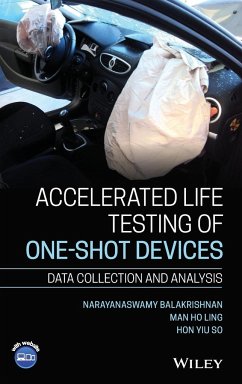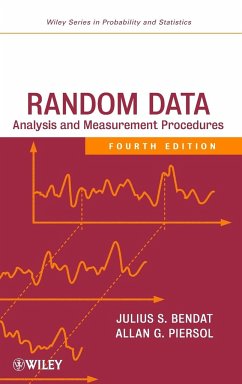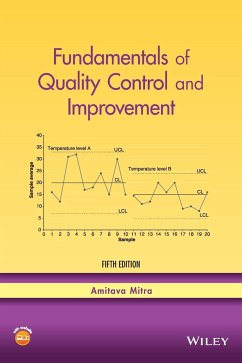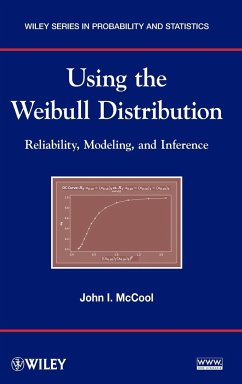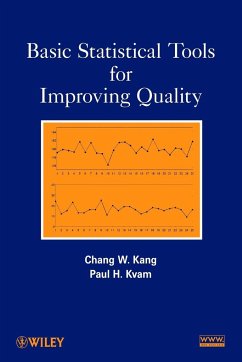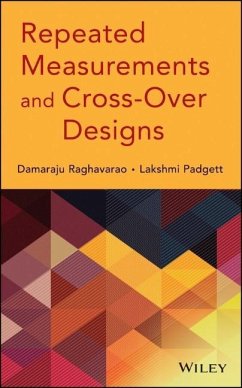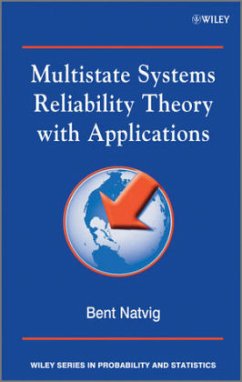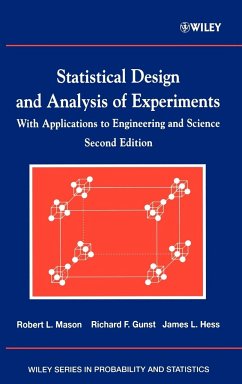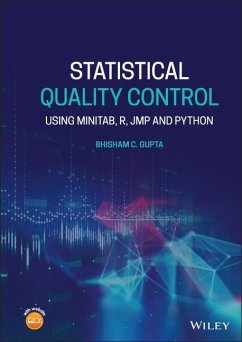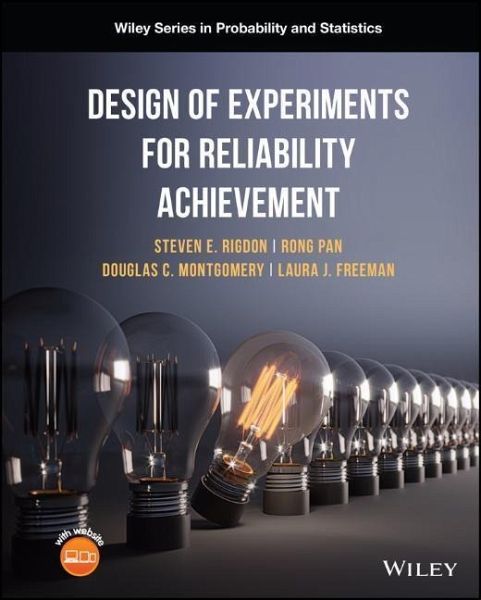
Design of Experiments for Reliability Achievement
Versandkostenfrei!
Versandfertig in über 4 Wochen
113,99 €
inkl. MwSt.
Weitere Ausgaben:

PAYBACK Punkte
57 °P sammeln!
ENABLES READERS TO UNDERSTAND THE METHODS OF EXPERIMENTAL DESIGN TO SUCCESSFULLY CONDUCT LIFE TESTING TO IMPROVE PRODUCT RELIABILITYThis book illustrates how experimental design and life testing can be used to understand product reliability in order to enable reliability improvements. The book is divided into four sections. The first section focuses on statistical distributions and methods for modeling reliability data. The second section provides an overview of design of experiments including response surface methodology and optimal designs. The third section describes regression models for r...
ENABLES READERS TO UNDERSTAND THE METHODS OF EXPERIMENTAL DESIGN TO SUCCESSFULLY CONDUCT LIFE TESTING TO IMPROVE PRODUCT RELIABILITY
This book illustrates how experimental design and life testing can be used to understand product reliability in order to enable reliability improvements. The book is divided into four sections. The first section focuses on statistical distributions and methods for modeling reliability data. The second section provides an overview of design of experiments including response surface methodology and optimal designs. The third section describes regression models for reliability analysis focused on lifetime data. This section provides the methods for how data collected in a designed experiment can be properly analyzed. The final section of the book pulls together all of the prior sections with customized experiments that are uniquely suited for reliability testing. Throughout the text, there is a focus on reliability applications and methods. It addresses both optimal and robust design with censored data.
To aid in reader comprehension, examples and case studies are included throughout the text to illustrate the key factors in designing experiments and emphasize how experiments involving life testing are inherently different. The book provides numerous state-of-the-art exercises and solutions to help readers better understand the real-world applications of experimental design and reliability. The authors utilize R and JMP(r) software throughout as appropriate, and a supplemental website contains the related data sets.
Written by internationally known experts in the fields of experimental design methodology and reliability data analysis, sample topics covered in the book include:
_ An introduction to reliability, lifetime distributions, censoring, and inference for parameter of lifetime distributions
_ Design of experiments, optimal design, and robust design
_ Lifetime regression, parametric regression models, and the Cox Proportional Hazard Model
_ Design strategies for reliability achievement
_ Accelerated testing, models for acceleration, and design of experiments for accelerated testing
The text features an accessible approach to reliability for readers with various levels of technical expertise. This book is a key reference for statistical researchers, reliability engineers, quality engineers, and professionals in applied statistics and engineering. It is a comprehensive textbook for upper-undergraduate and graduate-level courses in statistics and engineering.
This book illustrates how experimental design and life testing can be used to understand product reliability in order to enable reliability improvements. The book is divided into four sections. The first section focuses on statistical distributions and methods for modeling reliability data. The second section provides an overview of design of experiments including response surface methodology and optimal designs. The third section describes regression models for reliability analysis focused on lifetime data. This section provides the methods for how data collected in a designed experiment can be properly analyzed. The final section of the book pulls together all of the prior sections with customized experiments that are uniquely suited for reliability testing. Throughout the text, there is a focus on reliability applications and methods. It addresses both optimal and robust design with censored data.
To aid in reader comprehension, examples and case studies are included throughout the text to illustrate the key factors in designing experiments and emphasize how experiments involving life testing are inherently different. The book provides numerous state-of-the-art exercises and solutions to help readers better understand the real-world applications of experimental design and reliability. The authors utilize R and JMP(r) software throughout as appropriate, and a supplemental website contains the related data sets.
Written by internationally known experts in the fields of experimental design methodology and reliability data analysis, sample topics covered in the book include:
_ An introduction to reliability, lifetime distributions, censoring, and inference for parameter of lifetime distributions
_ Design of experiments, optimal design, and robust design
_ Lifetime regression, parametric regression models, and the Cox Proportional Hazard Model
_ Design strategies for reliability achievement
_ Accelerated testing, models for acceleration, and design of experiments for accelerated testing
The text features an accessible approach to reliability for readers with various levels of technical expertise. This book is a key reference for statistical researchers, reliability engineers, quality engineers, and professionals in applied statistics and engineering. It is a comprehensive textbook for upper-undergraduate and graduate-level courses in statistics and engineering.




